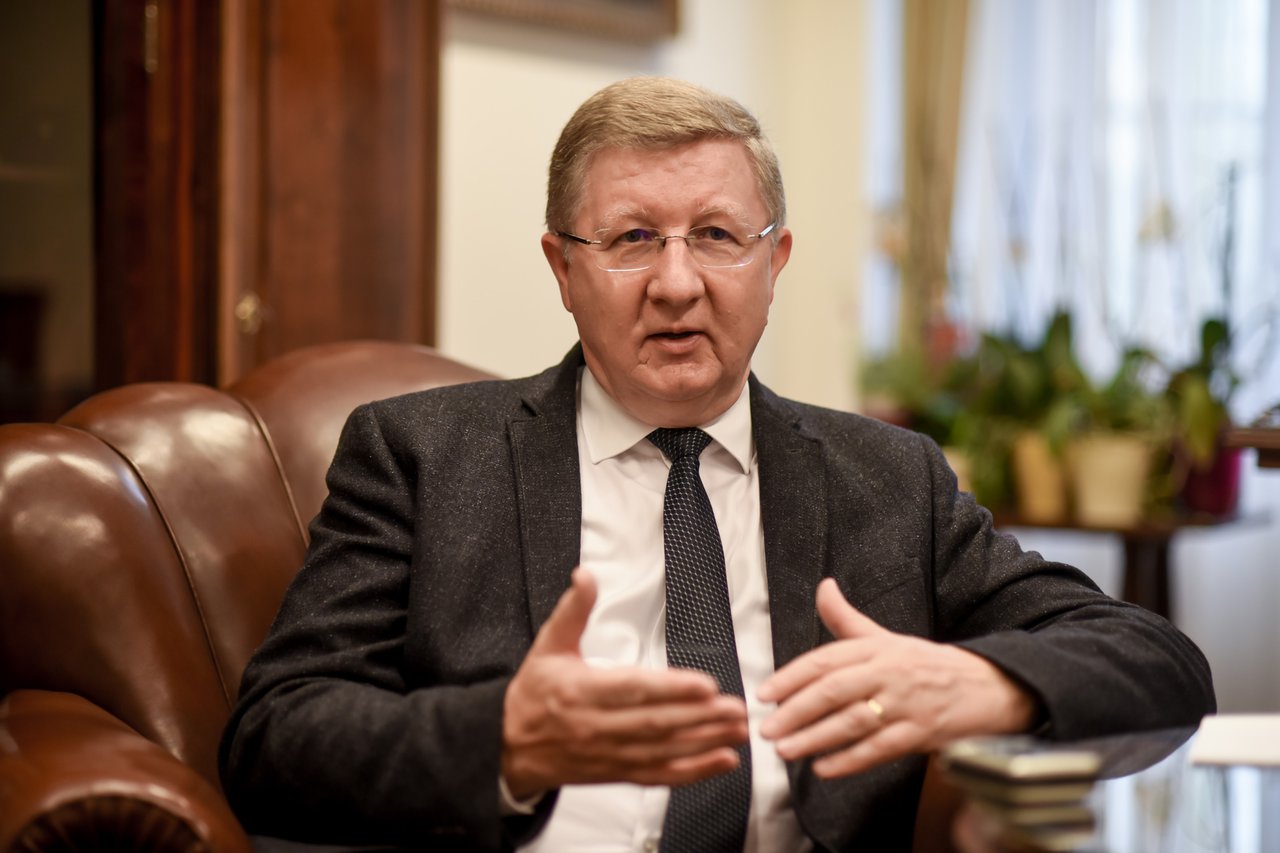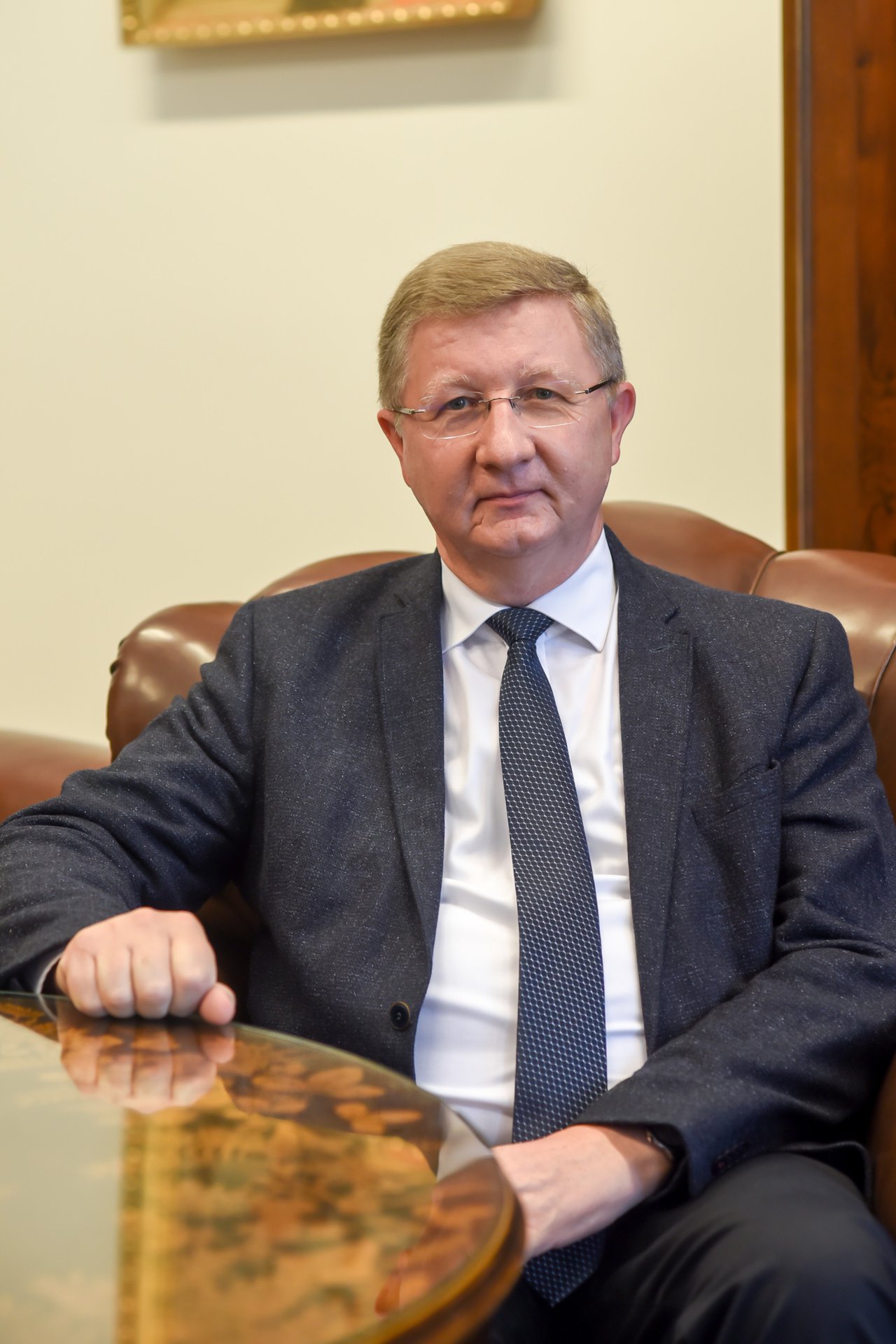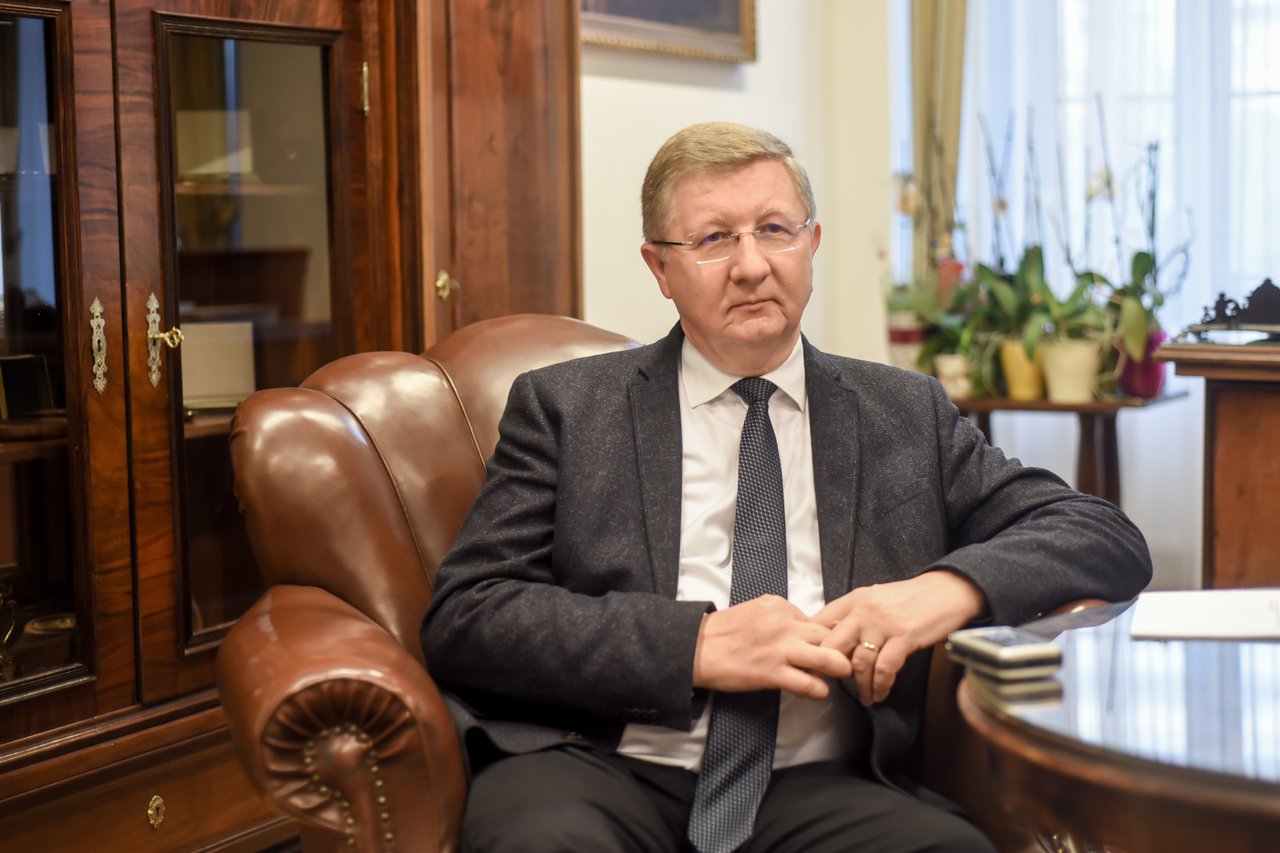It was back in 2015 that Transtibiscan Bishop Károly Fekete launched the programme entitled ‘Spread the Word of God’, he visited the congregations of his church district, and during the third wave of the coronavirus pandemic he made use of modern technology to engage Transtibiscan pastors in a discussion on Lent. The underlying principle of this initiative has been to have the church return to its original duty of sharing and spreading the Gospel. What experiences did he amass during his visits? How can such a mission endeavour be realized in an online setting? What are the main takeaways of the coronavirus? These and other topics were brought up by Sára Szirák during her interview with Bishop Fekete.
From 2015 on, you made visits to each presbytery within the framework of the church district programme ‘Spread the Word of God’, calling on congregations from Záhony to Szeged. Why did you find personal presence so significant?
When I was elected by the elders of congregations, I promised to be an approachable and available leader. Since then, I have been working on keeping that promise. Not only is my office door open to anyone, but I myself am also happy to meet pastors, elders and various age groups within congregations. Nothing compares to gaining in-person impressions and experiences.
What are the most important conclusions, experiences that you have gained and you wish to highlight? What are your impressions of Transtibiscan congregations?
There are a great number of church members who have an in-depth interest in Christian faith. They have formed opinions on church life, the present-day experience of the Gospel message, and the everyday struggles of professing their faith. They are open to discussing these topics, and they are able to check their life experiences against their faith in an honest and critical way. It is always reassuring to receive feedback that suggests that the listener has paid attention and understood the message of the sermon. I get the impression that people are open to the message of the Lord, and there are communities that want to learn and discover new interpretations and deeper knowledge.

Bishop Károly Fekete
What do these encounters look like?
The programme always begins with a worship service, followed by an educational lecture. Afterwards, the topic is further expanded with a themed testimony or comment by a pre-arranged list of speakers. Next, we continue the discussion in small groups; the opinions that arise are then shared by group representatives. Whenever possible, we also have the Lord’s Supper, and the event is concluded with a reception.
The underlying principle of ‘Spread the Word of God’ is to have the church return to its original duty, and draw attention to the significance of the Gospel and to the need of spreading it. Why do we have to remind ourselves about this?
We live in a polyphonic world, which often suppresses, lowers or outright mutes the sound of the Gospel. We must amplify, both internally and in each other, the Gospel of life. We must be able to listen to one another, and provide space for the Gospel message within us. We must speak out about our personal story that we experience with God, how He has redeemed us, how He guides, consoles and strengthens us. We must encourage each other through these personal experiences, the way the Apostle Paul has put it: “…that you and I may be mutually encouraged by each other’s faith.” (Rom 1:12). We do have something to say to each other, and we must be able learn from it!
This first initiative has given birth to further programmes, such as the ‘Transtibiscan Pilgrimage of the Scripture,’ ‘My Journey…’ and ‘Ref-Lectern.’ Each is its own thing, but they have the same seed and endeavour. What can you tell us about these initiatives?
In the year 2017, when we were celebrating the 500th anniversary of Reformation, each Transtibiscan congregation took turns to have the same unique, large-print version of the Bible in their possession. The aim was to read the Scripture together over the course of a year, and for neighbouring parish delegates to meet apropos of the Word of God. During my travels, the same two words kept coming up: talking and learning. These were the motivations behind the form of the two events. ‘My Journey…’ is a series of roundtable discussions in front of a pre-registered audience (due to the limited capacity of the venue). Together with the guests I invite, we have an in-depth discussion about a different topic each time. Last but not least, ‘Ref-Lectern’ aims to create opportunities for learning. Experienced pastors share their insights and educate their peers as well as regular church members in an area that they are committed to, talking about something they love and know well. Apart from the content, each training day focuses on methodology, in order to achieve more effective basic and background activities within congregations, and to have more successful Reformed community endeavours.

You did not leave pastors to their own devices even during the coronavirus pandemic: you organized online meetings. Over three hundred Transtibiscan pastors participated in the Lent discussions held online between 16-26 March. Why do you think it is important to keep talking even when we cannot meet in person?
The months-long community deprivation took its toll on me personally as well, but I tried to carry this burden with patience. I am not ashamed to admit that I missed my fellow pastors. I was interested in finding out about the real situation, but at the same time I also wanted the pastors living in various corners of their presbyteries to see the complexity of the pandemic, to listen to each other’s losses and hear the news of promising recoveries. I wanted them to talk about the grave responsibility of institution-maintaining congregations, and about the number of prayers said for the sick, the doctors, nurses, caregivers and each other.
How were these events organized in practice?
After the previous practice of making phone calls to pastors individually and sending video messages at the beginning of each cycle, we arranged the pastors of all nine Transtibiscan presbyteries into twenty groups and set up online discussions. With the help of technology, we were able to see and hear each other. I opened these online meetings with reading from the Scripture and saying a prayer. The prompt question participants were asked was what drained their energy and what replenished it. After listening to personal/family-related and congregation-related reports, I and the local dean shared some public information regarding the affairs of the church district and the presbytery, and each group formed a prayer community, beseeching the Lord of Life.

Based on these online meetings, what are your impressions about how pastors have felt about the changes resulting from the pandemic?
As far as I could see, the lockdown hit everybody hard. The realities of social distancing, closing down churches, the absence of traditional table communion posed a threat to the theological-pietistic core of our Reformed Christian worship services. At the same time, we felt the internal pressure to keep spreading the Word of God even in the most dire circumstances, because sharing the good news of the Gospel is a fundamental feature of our church life. Many pastors also talked about pains of a personal nature, having lost someone in their immediate family, circle of friends or a loyal member of their flock. The words they most often used to describe their experiences were: tragedies, fear, worry, uncertainty, anxiety, cautiousness, impatience, exhaustion, hibernation, sluggishness, division, work overload, realignment. Even during the pandemic, a lot of grant-based construction projects that were already underway were continued, many pastors undertook renovations, extensions and long overdue office rearrangements.
„It is on the pillars of cherished and meaningful encounters that a new bridge can be constructed, a bridge that arches above the obligate periods of distance, preventing our church life from falling apart completely.”
What are some good methods and practices that pastors made use of?
I am convinced that the sobering, encouraging, consoling and strengthening message of the Scripture, which holds a mirror up to us, is more important than ever in the current pandemic. I am extremely proud of my fellow servants of God who were able find ways to deliver homilies in this extraordinary situation, with the help of the technology available to them. The number of parish newsletters, magazines and sermons has increased, circulated either in print format or shared on social media platforms. There have been online sessions of worship and Bible study, youth groups, as well as other discussions. Pastoral care has been conducted over the phone, in order to reach with a scriptural message those confined to the walls of their home, an indication that they as individuals have not been forgotten.
Many churchgoers have been listening to the spiritual broadcasts of Radio Európa, a media outlet operated by the Cistibiscan and Transtibiscan Church Districts. In some congregations the women started to sew new altar cloths and linens, while others launched an initiative called ‘Heart-warming Delicacies,’ baking cakes and cookies for frontline hospital staff on a regular basis. So-called “doorstep visits” that comply with social distancing rules have also proved popular. Both pastors and congregation members have joined online church trainings. A series of witty names and ideas have come about: ‘Bible Verse Basket,’ with encouraging messages for take-away; ‘Scripture Morsels,’ with short written interpretations.
The online and print versions of a booklet called Refuge have been well-received beyond our expectations both within our church district and on a national level. Some congregations have even set up their own crisis fund, and the traditional envelope donations collected on holy days are not for the benefit of the community, but instead, are offered to families in need.
How has your answer to my earlier question regarding your impressions about Transtibiscan congregations changed since the move to the online sphere occurred?
There was a battle going on between the desire for community life and the fear for one’s life. Many, however, realized that greater faith does not give us license to behave irresponsibly. We were yearning for in-person church services because they cannot be substituted by even the best online broadcast.
We have never before seen so many worships, written and video content available on the Internet. What changes can we expect? How can we utilize these experiences? Besides in-person meetings we have to develop short and concise digital and online formats with Gospel content for weekdays, which provide an introduction, an invitation and a glimpse into our faith and way of thinking, so that those who have stayed away before, those who are still seeking and do not belong to a congregation are encouraged to take a step closer and find a community. We must exploit both in-person and online ways of sharing the Gospel in a complementary fashion. We know full well that what happens in the virtual sphere is not the same as what a personal encounter can offer, but it can be a good way of getting in touch with people.
One lesson I have learnt is that every meeting should be appreciated, because it provides resources until the next meeting. It is on the pillars of cherished and meaningful encounters that a new bridge can be constructed, a bridge that arches above the obligate periods of distance, preventing our church life from falling apart completely. From the point of view of mission, we must utilize every legal tool at our disposal, but on the other hand we are faced with the serious ethical dilemma that faith-based content is displayed in the context of the negative phenomena of social media, which means that our audience can easily turn to content that constitutes temptations. Another revelation I had is that the foreign elements, distances, superficialities, material problems, pietistic differences, deficits and communication issues that already existed before the pandemic became more apparent all at once and in a magnified way as a result of the crisis.
We can only learn from what was missing during the waves of the pandemic if we go on to build communities steadfastly and appreciate our meetings by really being present, living a Christian life that is appealing, meaningful and community-preserving. We, as well as the people we hope to welcome into the church of Christ, all need a greater number of uplifting and healing encounters.
The interview, tranlated by Erzsébet Bölcskei, was originally published in the Reformátusok Lapja, the Weekly Magazine of RCH.